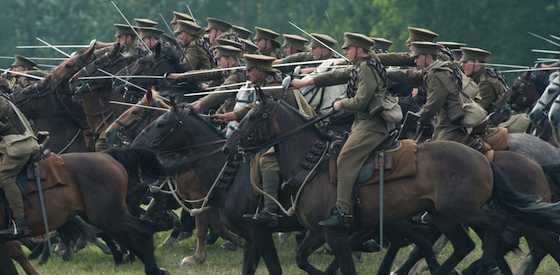- MENU
- HOME
- SEARCH
- WORLD
- MAIN
- AFRICA
- ASIA
- BALKANS
- EUROPE
- LATIN AMERICA
- MIDDLE EAST
- United Kingdom
- United States
- Argentina
- Australia
- Austria
- Benelux
- Brazil
- Canada
- China
- France
- Germany
- Greece
- Hungary
- India
- Indonesia
- Ireland
- Israel
- Italy
- Japan
- Korea
- Mexico
- New Zealand
- Pakistan
- Philippines
- Poland
- Russia
- South Africa
- Spain
- Taiwan
- Turkey
- USA
- BUSINESS
- WEALTH
- STOCKS
- TECH
- HEALTH
- LIFESTYLE
- ENTERTAINMENT
- SPORTS
- RSS
- iHaveNet.com: Movie Reviews

2 1/2 Stars
On stage in London and New York, "War Horse" has found a wide and emotionally drained audience. How could it be otherwise? The horrors of World War I plus the horrors of war as endured by a horse, capped by a ruthlessly effective happy ending: I don't mean to be glib, but that is an awful lot to cry about.
Befitting its origins as a children's novel by Michael Morpurgo, the
Read this back-cover description of the novel and see if it sounds like something you, a potentially interested party in the Spielberg film version, might simultaneously resent and admire. "It is 1914," goes the Scholastic paperback edition's back cover copy, "and Joey, a farm horse, is sold to the army and thrust into the midst of World War I on the
In its embrace of cinematic lore and language, Spielberg's "War Horse" is no less ardent an expression of nostalgia than the Michel Hazanavicius silent pastiche "The Artist," to name one film winning many more awards this season, or another widely admired ode to early cinema, Martin Scorsese's "Hugo." With "War Horse" Spielberg's influences begin and end with John Ford, especially the Ford of "How Green Was My Valley." Direct, unabashed emotional content; classically proven camera strategies and mise en scene; a belief above all in the power of the wordless, wonder-struck reaction shot: These are the tools deployed by Spielberg and his longstanding colleagues.
Though "War Horse" was filmed on location in England, much of it was fashioned (and doesn't try to disguise it) on soundstages, and by the end of the picture we're fully in the world of studio-bound and backlot fakery. In the finale, set against the reddest sunset this side of Tara, chuckles could be heard in the preview audience. But there were sobs as well. Clearly this material has what it takes to work over an audience and make that audience like it.
All the same, you cannot shake the feeling that Albert is barely a character. Played well enough by Jeremy Irvine, he's merely a repository of valor and goodness. The screenplay by Lee Hall and Richard Curtis fleshes out the step-by-step chapters as vividly as possible. The strongest supporting actors are welcome indeed, notably Tom Hiddleston as the British cavalry officer Capt. Nicholls; Emily Watson as Albert's mother; and especially Niels Arestrup as a French farmer who, along with his granddaughter played by Celine Buckens, takes Joey in for a lyric interlude in between bouts of trench warfare, first laboring for the British, then the Germans.
The way Spielberg's longtime cinematographer Janusz Kaminski lights both exterior and interior scenes, it's as if honey had poured down straight from the sun. "Storybook" is one description of the palette, I suppose, though when the material contains this much life-and-death melodrama a little restraint would've helped. (I felt the same way about "The Color Purple," this film's nearest relative in the Spielberg canon.)
For all of this movie's consciously mythic imagery, the scene that sticks with me in "War Horse" is a plain one, an unfussy but carefully worked-out farmhouse interior conversation, tense and suspenseful, dominated by Arestrup and an actor playing a German officer. It runs close to a minute, shrewdly shifting the audience's focus from one performer to another, and then another. You don't see shots like these very often; you need a director on the order of Spielberg, I suppose, to pull them off, not because they're "bravura" but because they're old-school and satisfying in ways that aren't left to the editing stage. He's a born filmmaker. I do hope, though, after "War Horse" and "The Adventures of Tintin," he gets ahold of young-adult material more worthy of his adult talent.
War Horse Movie Review - Jeremy Irvine and Emily Watson